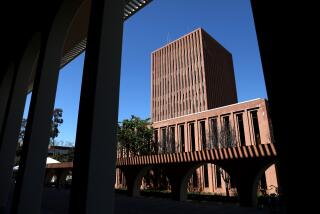THE GOODS : Get Rid of Your Blue Books, and Turn on Your Modem
- Share via
Take what is best about the university experience--charismatic professors, parties, provocative classroom discussions, sports, hands-on lab experience, concerts, camaraderie, late-night dorm raps--and toss them all out.
What you’re left with is a college course on the Internet.
And that, according to officials at the University of Massachusetts who are making one of the most ambitious forays into on-line college credit programs this fall, is not all bad.
“Obviously, you lose the special chemistry of face-to-face interaction in the classroom,” states one of the informational UMass pages on the Internet’s World Wide Web. “But that loss may be more than compensated by the relative anonymity of communications on the Internet.
“The biases that we all harbor involving age, sex, race, physical appearance, body language, etc., disappear in an environment where your main communications tool is the written word,” it goes on to say. “This can do wondrous things for open, fair, class discussion.”
The word discussion is being used loosely here. The UMass program and those at a handful of other universities offering on-line college credit courses basically operate via one-way communications on the Web and through e-mail.
Typically, a student will be given a password that allows access to a designated Web site that includes text lectures and other reading materials appropriate to a course. Homework assignments--in the form of essays, term papers and the like--are sent by the student to the teacher via e-mail.
In this way, on-line studies resemble the correspondence courses universities have been offering for years. But there are several enhancements that on-line studies can offer. The Web sites can be loaded up with far more materials found in typical correspondence courses, and links can be included to take the student to related topics throughout the vast Web.
The Web instructional pages are by no means limited to text--UMass plans to also provide sound and video files where appropriate, as well as photographs and graphics.
Also, teachers at UMass will supposedly be checking their e-mail boxes regularly for questions and notes from students, thus providing much faster responses. Students will be encouraged to e-mail each other, too, establishing on-line exchanges on class topics. E-mail more resembles responsive readings than true discussions, but to the folks at the UMass program, called CyberEd--where the glass always seems half-full--this also has advantages.
“Have you ever emerged from a heated class discussion, only to discover two hours later that you wished you had said something additional or different?” the creators of the program ask. “An on-line class ‘discussion’ doesn’t require an immediate response--you can wait, check resources and carefully word your response before posting it to the Web. This can raise the level of class discussions to new heights.”
In September, CyberEd will offer its first six courses, including Personal Finance, MIDI Composition Techniques and a history course on the Holocaust. These undergraduate three-credit courses cost $365 each. In addition, the student usually has to purchase some outside textbooks and other materials, plus, of course, have a computer and modem with Web access.
Closer to home, Cal State Dominguez Hills is offering students in its Humanities External Degree graduate program the option of sending in lessons and corresponding with instructors via e-mail. Currently, the program is limited to the five introductory classes in history, literature, music, art and philosophy, but campus officials say they plan to extensively expand their on-line offerings.
Christopher Newport University, a four-year institution in Newport News, Va., offers 25 classes on-line, including Scientific Reasoning and Elementary Spanish.
City University, based in Bellevue, Wash., has specialized since its founding more than 20 years ago in education for working adults by offering classes at satellite campuses and through correspondence. The Internet is a natural fit for this setup, and the university currently offers its entire master of business administration program on-line.
For more information on these and other emerging university on-line programs, use the wonderfully handy--and recently spruced up--Yahoo directory on the Web at https://www.yahoo.com/. Click on its “education” heading, and then on the subheading “On-Line Teaching & Learning.”
* Cyburbia’s Internet address is: Colker@news.latimes.com.







